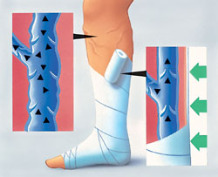New study compares leg ulcer treatments
Posted on 10 December 2013
The trial was coordinated by the York Trials Unit in the Department of Health Sciences at the University of York and was funded by the National Institute for Health Research as part of its Health Technology Assessment programme (NIHR HTA).

Though venous leg ulcers take a similar time to heal using both treatments, people reported less ulcer recurrence after using the stockings and required fewer nurse visits making the stockings better value for money for the NHS.
But the study, published in The Lancet, also found that the stockings were not popular with everyone, with more people changing from this to another treatment than in the trial group being treated with bandages.
Venous leg ulcers are common chronic wounds that are painful, recur and reduce quality of life. They are a consequence of damage or blockage to the veins of the leg which can result in skin breakdown and impaired healing.
Multi-layer compression bandages, which apply pressure to the leg, have until now been the main treatment for venous leg ulcers and are used by thousands of people. But the current method of treating these wounds costs the NHS millions of pounds per year.
Trial coordinator, Dr Rebecca Ashby, said "These results suggest compression hosiery may be an alternative treatment to bandaging for healing venous leg ulcers - a finding which is likely to be welcomed by patients who find bandages difficult and uncomfortable to wear."
The study, known as Venous leg Ulcer Study IV (VenUS IV), saw 454 people trial the two methods and will now help inform nursing practice.
Nikki Stubbs, Clinical Lead at Leeds Community Healthcare NHS Trust, said: “The findings support the use of compression stockings for some people with venous leg ulcers. Where appropriate, the day to day application of stockings can be undertaken by patients, carers and a range of health professionals. From a patient perspective this may promote independence as well as enabling the NHS to maximise the use of its resources to best effect.”
